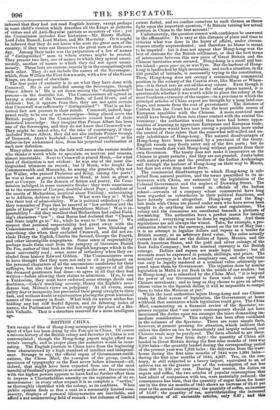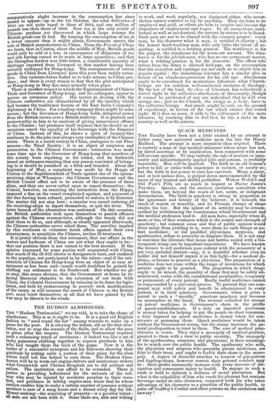BRITISH CHINA.
Tau receipt of files of Hong-kong newspapers invites to a retro- spect of what has been doing by the Fan-qui in China. Of course a minute history of the British colony and factories in China is not contemplated ; though the Hong-kong papers might afford ma- terials enough, and in proper place the narrative would be inter- esting. The English journals in China have from the beginning been characterized by a high standard of intellect and independ- ence. Strange to say, the official organ of Government-notifi- cations, the China Mail, the youngest of the group, (such a specimen of typography as the East never before witnessed—all, indeed, that might have been expected from one of the most tasteful of Scotland's printers) is as sturdy as the rest. Its connexion with the higher powers appears to have had no further effect than to impress a Chesterfieldian amenity on the expression of its re- monstrances : in every other respect it is as complete a "settler," as thoroughly identified with the colony, as its confreres. When public opinion finds so free a vent in a necessarily limited com- munity, displays of personal idiosyncracies are inevitable, and afford a not uninteresting field of remark : but columns of limited extent forbid, and we confine ourselves to such themes as throw light upon the important question, " Is Britain turning her actual position in China to the best account? "
Unfortunately, the question cannot with confidence be answered in the affirmative. It is easy at this distance of place and time to criticize what was done in the hurry of affairs, under circum- stances utterly unprecedented ; and therefore no blame is meant to be imputed : but it does not appear that Hong-kong was the best of stations for the British settlement, or that the beat terms
of intercourse between this new piece of Great Britain and the Chinese territories were secured. Hong-kong is a small and bar- ren island—passe pour la, so was Tyre. But the harbour of Hong- kong is landlocked by high mountains; and such a situation, in the 22d parallel of latitude, is necessarily trying to the constitution. Then, Hong-kong does not occupy a commanding commercial position in the estuary of the Canton river, like Macao or Wham- poa—it is thrust into an out-of-the-way corner. Even though it had been as favourably situated as the other places named, it is questionable whether it was worth while to place the colony at the most Southern extremity of the empire—in a province to which the
principal articles of China export are brought by a long land-car- riage, and remote from the seat of government. The distance of Canton from the Court has not been the least prolific source of European squabbles with the Chinese. A more centrical mart would have brought them into closer contact with the central Go- vernment.: the authorities would thus have had better oppor- tunities of learning to appreciate Europeans and European trade; and the traders would have been among a population more under the control of their rulers than the somewhat self-willed and un- ruly inhabitants of Hong-kong. The natural disadvantages of Hong-kong have been increased by a provision of the treaty. English vessels may freely enter any of the five ports ; but no Chinese vessels dare visit Hong-kong without permits from their own Governors. The treaty does not make it imperative on the Chinese to grant permits ; and they are not granted. Junks laden with native produce and the produce of the Indian Archipelago sail through the harbour of Hong-kong on their way to Macao, but dare not even drop anchor there.
The commercial disadvantages to which Hong-kong is sub- jected from natural position, and the terms prescribed to its in- tercourse with China, are enhanced by the legislation of the Colonial Government and the neglect of Downing Street. The local authority has been vested in officials of the Indian school—servants of a company whose commercial have long been regarded as subordinate to their political functions, and have latterly ceased altogether. Hong-kong and the Eng- lish trade with China are placed under men who have never been taught to do anything but make rules and regulations. The colony and the commerce are smothered beneath a plethora of lawmaking. The authorities have a perfect mania for issuing ordinances ; everything must be done by regulation. And these regulations are not always the wisest. Take, for example, a pro- clamation relative to the currency, issued on the 1st of May last : it is an attempt to legalize dollars and rupees as a tender for British money, at an arbitrary fixed value. The coins actually current in the island are the dollars of Spain, Mexico, and the South American States, and the gold and silver coinage of the East India Company; but the nominal currency is the British coinage. Dollars and rupees are made legal tender ; but all accounts must be expressed in pounds, shillings, and pence. The nominal currency is in fact an imaginary one, and the real coins can only be legally tendered at a nominal value arbitrarily im- posed upon them by Government. The injustice done by similar legislation in Malta is yet fresh in the minds of our readers : but in Hong-kong, as is remarked by the China Mail, " it is beyond the power of our Government to force such coins upon the Chinese merchants ; and so long as they choose to give an adven- titious value to the Spanish dollar, it will be impossible to compel them to take the Mexican at par." While the local authorities injure Hong-kong and our Chinese trade by their excess of legislation, the Government at home withhold that assistance which legislation could give. The China Mail, commenting on a financial review of the Spectator, ex- presses surprise that " our astute contemporary should not have mentioned the duties upon tea amongst the taxes demanding im- mediate consideration." This subject has been often ventilated in the columns of the Spectator. There are some simple facts, however, at present pressing for attention, which indicate that unless the duties on tea be immediately and largely reduced, our Chinese trade may be paralyzed. The facts alluded to are these. Raw silk is now free from duty : the quantity of China silk landed in Great Britain during the first nine months of 1844 was 2,250 bales—the quantity landed during the corresponding period of the present year was 7,323 bales : the deliveries from the ware- house during the first nine months of 1844 were 1,934 bales— during the first nine months of 1845, 4,927. Tea, on the con- trary, is still subjected to a heavy impost, equivalent to an ad valorem tax on the greater part of the consumption of not less than 200 to 250 per cent. During last session, the duties on sugars and coffee, the two articles of popular consumption that best admit of comparison with tea, were materially reduced: the consequence has been, that the quantity of sugar taken for home use in the first six months of 1845 shows an increase of 25.41 per cent in the annual consumption; the quantity of coffee, an increase of 15.07: the quantity of tea, notwithstanding the increased consumption of all exciseable articles, only 0.87 ; and this comparatively slight increase in the consumption has since ceased to appear—up to the 1st October, the total deliveries of 1845 are not quite equal to those of 1844, and one million of pounds less than those of 1843. Now tea is the only article of Chinese produce yet discovered in which large returns for British goods can be had. By keeping the consumption of tea at a lower amount than it might attain, Government arrests the sale of British manufactures in China. From the Friend of China we learn, that in Canton, about the middle of May, British goods could only be sold at a loss, in consequence of shipments of tea and silk having ceased to be made in large quantities; and that the Shanghae market was little better, a considerable quantity of shirtings exported from Liverpool to that market having been actually reshipped for Hong-kong. The consignments of cotton goods to China from Liverpool have this year been rashly exten- sive. Our customs-duties forbid us to take returns in China pro- duce ; and there is every reason to fear that the glut anticipated at Hong-kong in May has since actually taken place.
There is another respect in which the Superintendent of Chinese Trade and Governor of Hong-kong, and his colleagues, appear to pursue an erroneous policy. His tactics in dealing with the Chinese authorities are characterized by all the timidity which had become the traditional feature of the East India Company's diplomacy in China. For a trading company there might be some excuse; but the Governor of Hong-kong holds delegated power from the British crown over a British territory. It is prudent and praiseworthy in him to be cautious of giving unnecessary offence to the Chinese ; but prudence itself requires that he should on all occasions assert the equality of his Sovereign with the Emperor of China. Instead of this, he shows a spirit of lacquey-like readiness to do the jobs (not always very creditable) of the Chinese rulers. There is a secret society in China, analogous to our Free- masons—the Triad Society : it is an object of suspicion and persecution to the Chinese Government : intimation was made some time ago to the Governor of Hong-kong that members of this society were repairing to his island, and he forthwith issued an ordinance enacting that any person convicted of belong- ing to it should be punished as a felon and branded. About the beginning of May, a complaint was made by the Hoppo of Canton to the Superintendent of Trade against one of the opium- receiving ships at Whampoa : the Chinese Government and the British Consul affect not to be aware of the presence of these ships, and they are never called upon to report themselves; the Consul, however, on receiving the intimation from the Hoppo, imposed a fine on the vessel complained against, and payment of the fine having been refused, proceeded to enforce it by distraint. The matter did not stop here : a circular was issued ordering all the receiving-ship's to report themselves, or quit the river. The latter branch of the alternative was embraced. On this occasion, the British authorities took upon themselves to punish offences against the Chinese revenue-laws, although the treaty did not bind them to do so, and although, as clearly appeared afterwards, the Chinese authorities never asked them. The servility implied by this readiness to volunteer harsh offices against their own countrymen, to propitiate the Chinese, invites ill-treatment.
It is pretty obvious from this retrospect, that our affairs in the waters and harbours of China are not what they ought to be— that 'our position there is not turned to the best account. If the opinion expressed by some parties well acquainted with China, that much of the ill-will shown to foreigners is local, and confined to the populace, not participated in by the rulers—and if the sub- stitution of Chusan for Hong-kong were an object of as easy at- tainment as has been said—much would doubtless be gained by shifting our setlement to the Northward. But whether we go or stay, this seems obvious, that the Government at home by re- laxing financial obstacles to the extension of our trade with China, the Colonial Government by relaxing in its furor for legis- lation, and both by endeavouring to procure such modifications of the treaty as will increase the resort of Chinese to the British port, must exert themselves, or all that we have gained by the war may be thrown to the winds.



























 Previous page
Previous page